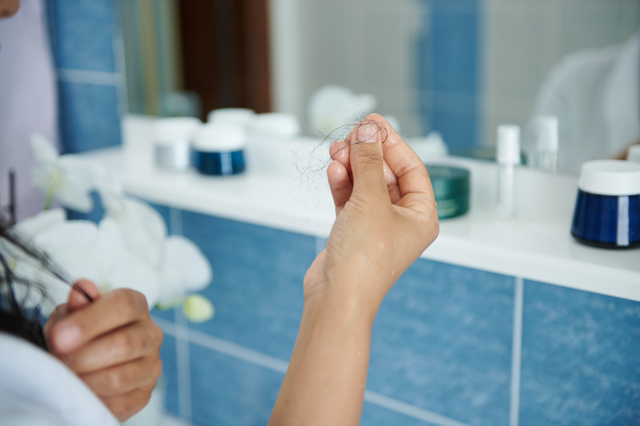Article: Hormones and Hair Loss: Understanding the Connection and Finding Solutions

Hormones and Hair Loss: Understanding the Connection and Finding Solutions
Hair loss is a deeply personal and often frustrating experience that many women face at various stages of life. While there are numerous factors that contribute to thinning hair, hormonal changes are among the most common culprits. Understanding how hormones impact hair growth and knowing what you can do to combat hair loss can help you regain not only your hair but also your confidence.
How Hormones Affect Hair Growth
Your hair goes through a natural cycle of growth, rest, and shedding. Hormones like estrogen, progesterone, and testosterone play a crucial role in maintaining this cycle. When hormone levels fluctuate, especially during significant life events like pregnancy, menopause, or perimenopause, it can disrupt this cycle and lead to hair thinning or loss.
• Estrogen and Progesterone: These hormones help keep your hair in the growing phase for longer periods. When their levels drop, as seen during menopause or after childbirth, hair may enter the shedding phase prematurely.
• Testosterone and DHT: In some women, testosterone can be converted into a more potent androgen called Dihydrotestosterone (DHT). DHT can shrink hair follicles, making it difficult for hair to grow and causing thinning along the hairline and crown.
Common Causes of Hormonal Hair Loss
1. Postpartum Hormone Shifts: After childbirth, estrogen levels drop significantly, often leading to noticeable hair shedding in the months following delivery.
2. Menopause: The decrease in estrogen and progesterone levels during menopause can cause hair to thin, especially around the hairline.
3. Perimenopause: The years leading up to menopause are often marked by hormonal fluctuations that can affect hair density.
4. Thyroid Imbalance: Both hypothyroidism and hyperthyroidism can disrupt hair growth due to hormonal imbalance.
5. Stress-Induced Hormonal Changes: Chronic stress can increase cortisol levels, which may lead to hair thinning over time.
How to Address Hormonal Hair Loss
While hormonal hair loss can feel overwhelming, there are effective ways to manage and improve it:
• Topical Treatments: Products infused with natural ingredients like rosemary oil, pumpkin seed oil, and saw palmetto can help block DHT and stimulate hair growth. Our Rosemary Revive Hairline Growth Treatment is designed to nourish the scalp and encourage the appearance of thicker, fuller hair.
• Scalp Stimulation: Increasing blood flow to the scalp can enhance hair follicle health. Using a tool like our Hair Growth Stimulator, an electric scalp massager, helps improve circulation and ensures that your scalp absorbs essential nutrients for growth.
• Nutritional Support: Supplements rich in biotin, collagen, and other hair-healthy vitamins can provide internal support for hair growth.
• Consistent Hair Care Routine: Gentle scalp massages, avoiding harsh chemicals, and using products specifically formulated for thinning hair can make a significant difference over time.
Why Choose Evoke Apex for Hormonal Hair Loss?
At Evoke Apex, we understand the emotional toll that hair loss can take, especially when it’s tied to the natural hormonal changes women experience. Our products are crafted with powerful, science-backed ingredients to help you restore your hair and your confidence. Whether you’re navigating postpartum hair loss, the challenges of menopause, or other hormonal shifts, our Rosemary Revive and Mega Growth Bundle offer effective, luxurious solutions tailored for women like you.

